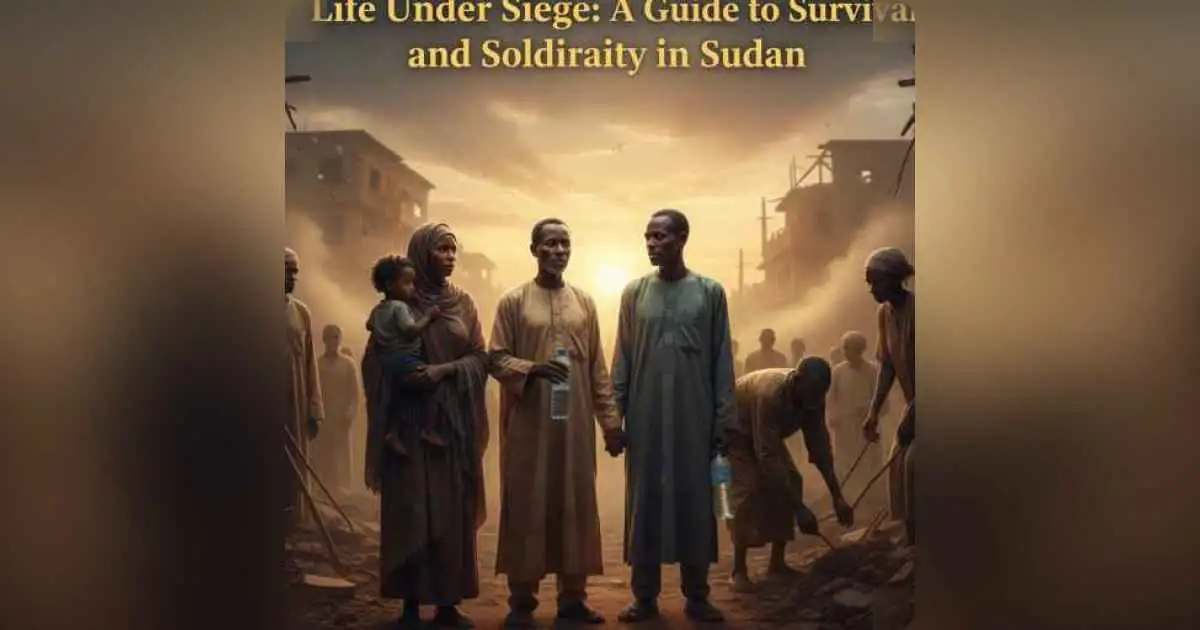Introduction
Sudan stands at a crossroads of unimaginable hardship. Since the conflict erupted, millions of civilians have found themselves trapped between violence, displacement, and uncertainty. Cities that once thrived with music, trade, and cultural pride now echo with fear and silence. Yet, amid the chaos, stories of courage, resilience, and solidarity continue to emerge.
This guide is not another news summary it is a practical survival and support manual for those living under siege and for the global community seeking to help. Whether you are in Sudan, part of the Diaspora, or an ally abroad, the message is simple: survival is possible, and solidarity is powerful.
1. Understanding the Crisis
Sudan’s conflict has led to widespread destruction of infrastructure, shortages of food, medicine, and electricity, and a breakdown of communication networks. Civilians are often the first to suffer. Armed clashes, looting, and the targeting of essential facilities have forced millions to flee, while those remaining face daily threats to their lives and dignity.
But knowledge is the first defense. Stay updated Through verified local networks, humanitarian organizations, and digital platforms that provide real-time information such as:
-
- Sudan Crisis Map (UNOCHA) for regional updates
- Radio Dabanga for local news in Arabic and English
- Sudan Safety Hub (community-run Telegram channels) for verified alerts
2. Practical Survival Strategies
When living under siege, survival depends on calm planning and resourcefulness. The following steps can help you stay safe and prepared.
How To: Stay Safe and Prepared
-
- Secure essentials early.
- Keep a go-bag ready with IDs, medicines, cash, a power bank, flashlight, and a small food supply.
- Identify safe zones.
- Note down nearby shelters, schools, religious centers, or trusted neighbors where you can seek refuge during bombardments.
- Stay discreet online.
- Avoid posting real-time locations or sensitive information on social media. Use secure messaging apps with encryption (e.g., Signal).
- Water and hygiene.
- Store clean water in sealed containers. Boil or purify when possible. Improvised filtration using charcoal and cloth can help in emergencies.
- Medical readiness.
- Keep a basic first-aid kit. Learn how to disinfect wounds and manage fever or dehydration with household items like salt, sugar, and clean water.
3. Communication in a Blackout
When internet or phone lines go down, information becomes survival currency.
-
- Use radio networks shortwave radios are still a lifeline in several Sudanese cities.
- Organize community bulletin boards or word-of-mouth alert systems.
- Establish code phrases with family members for safe confirmation messages (e.g., “I saw the bird today” = “I’m safe”).
4. Emotional and Community Resilience
War isolates, but collective resilience heals. Coping with trauma requires both individual strength and social connection.
-
- Talk regularly with someone you trust. Silence deepens fear.
- Community kitchens or shared meals even if symbolic help restore a sense of normalcy.
- Faith and cultural rituals (songs, prayers, storytelling) preserve identity and dignity amid destruction.
- NGOs and diaspora networks are creating digital therapy sessions and peer-support WhatsApp groups for those affected.
Remember: healing starts not after the war, but during it when people care for one another.
5. How the Global Community Can Help
For allies, donors, and journalists outside Sudan:
-
- Verify before sharing. Avoid amplifying unverified reports or images that could endanger people on the ground.
- Support trusted humanitarian organizations like the Sudanese Red Crescent, Médecins Sans Frontières (MSF), and local grassroots collectives.
- Amplify Sudanese voices. Share stories written by Sudanese journalists, poets, and survivors not just headlines from international agencies.
Solidarity is not charity; it is a recognition of shared humanity.
6. How To: Rebuild Hope in Daily Life
Even under siege, small routines matter.
-
- Create a daily plan. Structure brings a sense of control.
- Teach or learn something new. Even a 10-minute lesson with children can keep minds active.
- Document your story. Writing, drawing, or recording personal experiences can preserve truth and offer emotional release.
Each act of resilience becomes a quiet form of resistance.
7. Looking Ahead
The Sudanese people have endured countless hardships, yet their spirit remains unbroken. “Life under siege” does not mean the end of life it means living differently, more consciously, and with unshakable courage.
While the world watches, it must also listen to those who continue to live, love, and rebuild amidst ruin.
Sudan’s story is not one of defeat, but of survival and solidarity.
FAQs
1. What are the most reliable sources for Sudan conflict updates?
The most trusted ones include Radio Dabanga, UNOCHA’s Sudan Crisis Reports, and verified local Telegram groups like Sudan Safety Hub.
2. How can civilians protect themselves during airstrikes or shelling?
Move away from windows, stay near interior walls, and protect your head and neck. Avoid rooftops or open areas.
3. What should be included in an emergency survival kit?
ID documents, cash, water, dry food, first aid, flashlight, battery bank, radio, and copies of essential phone numbers.
4. How can people outside Sudan contribute safely?
Donate to verified NGOs, spread awareness through credible channels, and avoid misinformation or exploitation of victim imagery.
5. What emotional support options exist for Sudanese families?
Online counseling via diaspora initiatives, religious community groups, and digital peer-support circles on WhatsApp or Telegram.
Final Thought
In times of siege, information is survival, compassion is power, and unity is the path forward.
Even as cities fall silent, the collective heartbeat of Sudan continues a rhythm of endurance, dignity, and hope.
Related article: 10 Promising Career Opportunities Shaping the Future Workforce




